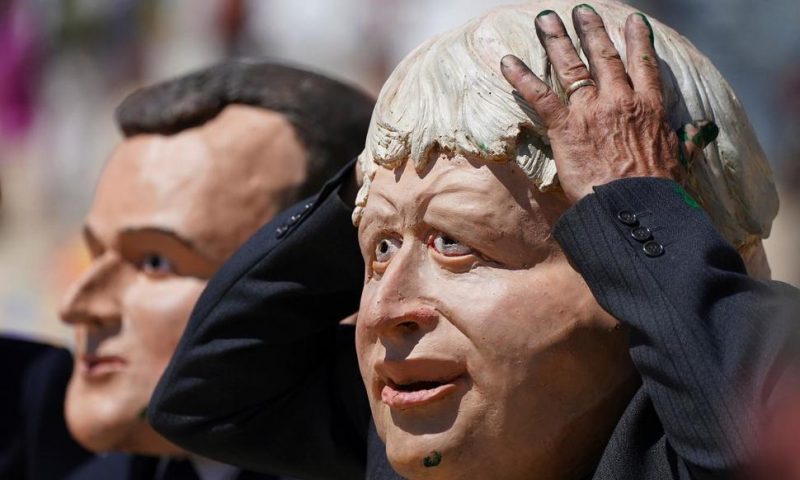Britain is accusing European Union leaders of holding the “offensive” view that Northern Ireland is not fully part of the United Kingdom.
FALMOUTH, England — Britain accused European Union leaders on Sunday of holding the “offensive” view that Northern Ireland is not fully part of the United Kingdom, as Brexit cast a shadow over the Group of Seven summit.
Britain and the EU are in a spat over post-Brexit trade arrangements that could see British sausages banned from entering Northern Ireland, the only part of the U.K. that borders the 27-nation bloc. The dispute is raising political tensions in Northern Ireland, where some people identify as British and some as Irish.
British media reported that Prime Minister Boris Johnson asked French President Emmanuel Macron when they met Saturday in the English seaside resort of Carbis Bay how he would feel if sausages from Toulouse could not be moved to Paris. They said Macron replied the comparison did not work because Paris and Tolouse were part of the same country.
The French presidency did not deny Macron had made the comments. It said he was explaining “that Toulouse and Paris were on a geographical unity of territory, Northern Ireland is on an island. The president wanted to stress that the situation was quite different and that it’s not appropriate to hold that kind of comparison.”
Macron dismissed the kerfuffle at a news conference on Sunday, saying that “as far as this subject matter is concerned everybody has got to come back to reason.”
“France never allowed itself to question British sovereignty, the integrity of the British territory, and the respect of that sovereignty,” he said. But the French leader repeated his insistence that the U.K. implement the Brexit deal that both sided signed on to.
“On this topic, everyone should return to reason, and my wish is we succeed, collectively, to put in motion what we all decided upon together several months ago,” Macron said. “We should do it in all calm and with mutual respect, and I think that polemics every morning are not helpful.”
U.K. Foreign Secretary Dominic Raab said the idea that Northern Ireland was not an integral part of the U.K. was “not only offensive, it has real world effects on the communities in Northern Ireland, creates great concern, great consternation.”
“Can you imagine if we talked about Catalonia, the Flemish part of Belgium, northern Italy, Corsican France, as different countries?” Raab said on Sky News. “We need a bit of respect here. And also, frankly, an appreciation of the situation for all communities in Northern Ireland.”
Relations between Britain and the EU have soured since the U.K. made its final break from the bloc at the end of 2020, more than four years after voting to leave.
The EU is angry over the British government’s delay in implementing new checks on some goods coming into Northern Ireland from the rest of the U.K., as was agreed in the Brexit divorce deal. The bloc is threatening legal action if the U.K. does not fully bring in the checks, which include a ban on chilled meats such as sausages from England, Scotland and Wales going to Northern Ireland beginning next month.
Britain accuses the EU of taking a “purist” approach to the rules, leading to burdensome red tape for businesses. Johnson has said if no solution is found he may pull an emergency brake allowing either side to suspend parts of their agreement. It is intended for use only in extreme situations, but the EU briefly threatened to invoke it in January to stop vaccine doses from Ireland crossing the border.
U.S. President Joe Biden has even been drawn into the spat, raising concerns about the potential threat to Northern Ireland’s peace accord.
The new arrangements, designed to keep an open border between Ireland and its northern neighbor, have angered Northern Ireland’s British unionists, who say they weaken ties with the rest of the U.K. Tensions over the new trade rules contributed to a week of street violence in April, largely in unionist areas of Northern Ireland, which saw youths pelt police with bricks, fireworks and firebombs.

